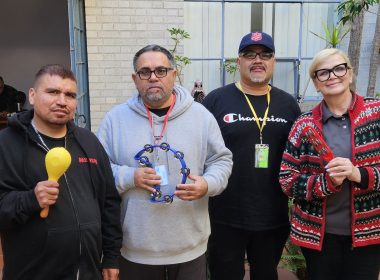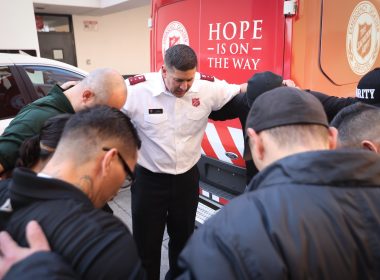An excerpt from “Garden City: Work, Rest, and the Art of Being Human.”
The other day I was out for coffee with my friend Dave.
Dave had asked if we could get together and talk about his fight with depression. Unfortunately, I’m a bit of an expert on the subject. My own tangle with depression was brutal and terrifying, but I made it through, and here I am. A better man because of it, oddly enough. I learned a fair bit through my years in the maw of the beast, and I’m always happy to help however I can.
Dave wasn’t suicidal or anything, just unhappy. But he had no clue why. He kept saying, I don’t get it. I follow Jesus. And I have a great life. Why am I depressed?
My take on depression is that it’s more of a symptom than a disease. That something in your life is causing the depression. So usually with somebody like Dave I start digging. What’s underneath the depression? The root under the ground?
Dave was kind enough to put up with my interrogation—Are you sleeping enough? How are you eating? Do you exercise? Talk to me about your prayer life? How’s your marriage? I was relentless. But he couldn’t think of anything “wrong” with him.
Then I started asking questions about his job. Do you like what you do?
It’s a good job, he said.
Yes, but do you like what you do? Do you wake up in the morning with a sense of anticipation? Of excitement for the day ahead?
Well, no, not really.
And for good reason. It turns out that Dave used to be a Navy Seal. Full on. He can hold his breath under water for like three days. After he got out of the Navy, he moved back home to Portland and took over his dad’s lighting business. It was a steady income. Great pay. He was able to buy a home and live well. Just one catch—he couldn’t care less about lighting. I mean, if you wanted a great deal on a commercial fluorescent, he was your man. But it wasn’t him. He went from a job pushing his body well past the limit and risking his life every day to a cold metal desk with a laminate top and a computer stuck in Excel.
So I asked Dave one of my favorite questions, If you could do anything, what would you do? He started to slide around in his chair. Discomfort was all over his face.
Most of us are too scared to even think about that question. The odds of letdown are really high.
In fact, you’re probably feeling like Dave right now—questions racing through your mind.
For now, set your anxiety aside. I want you to sit in the discomfort of my question to Dave: “If you could do anything…”
After an awkward silence, David said, “Well, I guess I would love to be a police officer.”
So I asked the immediate follow-up question: Why don’t you just quit? Give it a shot?
He immediately started into a litany of reasons why he couldn’t do that. Even though he was a bit nervous, I felt like we were on to something.
At the end of our conversation I just said, Dave, here’s what I would do: go home. Talk to your wife and then your dad. Think and pray. Why don’t you at least try?
Now, fast-forward about six months. I hadn’t seen Dave in a while and never heard back on our conversation, but the next time I ran into him, he was beaming. It was obvious something had changed.
Turns out, he did it. He quit the family business, and his dad was just fine with it. And he got a job with the local police department. He had to start at the bottom, but for the first time in years, he woke up before his alarm.
Dave was the same guy. Same wife, family, church, city, exercise routine, coffee shop, lawn to mow, dentist.
All that changed was his job. What he got up to do every day.
Why is that? How could something as mundane and ordinary as a job change everything for Dave?
I would argue it’s because what we do is central to our humanness.
What’s the first question we usually ask somebody when we meet them?
“So, what do you do?”
There’s a nasty rumor floating around the church right now, and it sounds something like this: It’s who you are that matters, not what you do.
Really? Where do the Scriptures teach that?
Currently there’s a much-needed backlash against this unhealthy way of thinking. But be careful that the proverbial pendulum doesn’t bang you over the head. What we do flows from who we are. Both matter.
After all, the vast majority of our lives is spent working.
By working I don’t just mean our job or career. Work is way more than what we get paid for. It’s cooking dinner, cleaning your apartment, washing the car, exercise, running errands—the stuff of everyday life.
And the next largest slice of the pie chart is spent resting.
By resting I don’t just mean the ancient ritual of Sabbath, although we’ll get into that in depth. I mean sleeping, your day off, time on the couch with a good novel or movie, brunch with your friends, vacation—the stuff we look forward to and savor. The moments when we wish life had a Pause button.
In the church, we often spend the majority of our time teaching people how to live the minority of their lives.
I lead a church, so I’m not criticizing anybody but myself right here. I teach people how to read the Scriptures and pray and do God stuff. But how much time do we spend reading the Scriptures every day? A half hour maybe? And how much time do we spend in prayer? I know that’s a bit hard to measure, so just take a guess. I set aside an hour every morning to read and pray, but still, that’s a tiny fraction of my life.
I mean, it’s basic math.
Most of us sleep for about eight hours a day. Then we get up and go to work for another eight hours, if not more. But factor in about an hour for your commute—on your bicycle if you live in my city or on the bus or in your car. Throw in some time to stop for gas or get a cup of coffee. Then it takes about two hours a day to eat and take care of your to-dos. And let’s throw in another hour for exercise. So now we’re at eight hours a day for rest and twelve hours a day for work. That leaves four hours left in your day.
And we all know where you spend those four hours…Netflix.
Seriously, all we have is a few short hours a day for the Scriptures, prayer, church, community, the gospel—all the “spiritual” stuff. And that’s if you slay the Netflix dragon and give every spare minute of your spare time to cultivating your spirituality.
Honestly, do any of us live this way?
What I’m getting at is this: in the church we need to talk about all of life. What it means to be a disciple of Jesus at church and at our job, school, gym, coffee shop, on our day off, when we go shopping or to the theater or on a date, and so on. This means we have to talk about work, because it consumes the lion’s share of our lives.
All too often there is a massive disconnect between “spiritual life” and life. The way of Jesus isn’t about detaching from the world and hiding in a mountain cave like somebody stuck in an episode of Lost. Jesus was a construction worker, for decades, in a village, Nazareth. Then he was a rabbi, or a teacher. His way is about living a seamless, integrated life, where the polarization between the sacred and the secular is gone, and all of our life is full immersion in what Jesus called the kingdom of God. But this will never happen unless we recapture a theology of work and rest and the art of being human.
The core question of this book, driving every page forward, is, What does it mean to be human?
Put another way, Why do we exist? What are we here for? What’s our meaning? Our purpose? Is there any?
Now, in the church, we usually give a spiritual-sounding answer. But as you may or may not know, the Scriptures open with a very different kind of answer. One that’s a lot more down to earth. Literally.
In Genesis, God says, Let us make mankind in our image, in our likeness, so that they may rule…
There it is.
Staring us in the face all these years.
Why did God make humanity? “So that they may rule.” In Hebrew, the original language, it’s even clearer. The text can be translated, “God made human in order to rule.” You and I were created to rule over the earth. That’s our meaning, our purpose—it’s why we exist.
This language of ruling is a little weird sounding to most of us. I doubt the last time your boss asked what you were doing, you said, Just ruling over my email. We’ll get into what ruling is all about, but for now, let’s just say it’s a lot like what we call work.
The mantra of our culture is that we work to live. The American dream—which started out as this brilliant idea that everybody should have a shot at a happy life—has devolved over the years into a narcissistic desire to make as much money as possible, in as little time as possible, with as little effort as possible, so that we can get off work and go do something else.
What a miserable way to live.
It’s striking to me that a number of people I know who made a bunch of money and retired young are unhappy. Grouchy. Cantankerous. Angsty.
It’s like they lost something central to who they are.
In Genesis’s vision of humanness, we don’t work to live; we live to work. It flat out says we were created to rule—to make something of God’s world.
That’s why unemployment is so gut-wrenching and depressing for people.
It’s why people who hate what they do for a living are discontent—no matter how much money they make.
It’s why the elderly or disabled are often unhappy and desperately want to contribute to society.
Because when we stop working, we lose a part of who we are. And the same is true of rest. When all we do is work and work and work, day in, day out, with no space, no margin, we grind our soul down to the bone. We become more machine than human being.
So whoever you are, and whatever it is you do…College student.
Mom.
Barista.
Engineer.
Librarian.
Artist.
Physicist.
Grocery checker at the local market.
This book is for you.
And this book is for me.
Because this book isn’t about how to get ahead in your career or spice up your résumé. The guts of this book are about working, resting, and living a full existence. About “spiritual life” invading all of life. And about waking up to a God-saturated world.
Adapted from “Garden City” by John Mark Comer. Copyright © 2025 by John Mark Comer. Used by permission of Thomas Nelson. Available wherever books are sold. HarperCollinsChristian.com
Do Good:
- Read “Garden City: Work, Rest, and the Art of Being Human” by John Mark Comer.
- Join us in giving joy to families who are experiencing poverty, hunger, job loss and more. Your generosity offers joyful reassurance that even during our most challenging times, we are not alone.
- What if five minutes a day could re-center your family on the reason we celebrate? Meet the free Caring Advent Paper Chain—25 days to Read, Reflect and Pray. Refreshed for 2025!











